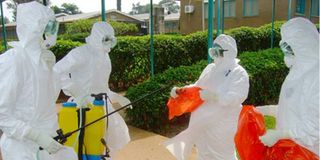DRC promises to rein in officials after sexual abuse scandal

Health officials wearing Ebola protective gears.
Congolese officials are promising to set up an independent inquiry and punish local officials involved in sexual assaults detailed in a recent investigation by the World Health Organization (WHO).
But Kinshasa’s promise comes as those who had blown the whistle on abuses received threats for pushing for offenders to be punished in a country where such abuses are reported on a regular basis.
A damning report by the WHO last week indicated that massive sexual abuse, including rape, was committed by employees of the UN agency as well as officials in the local health ministry in North Kivu and Ituri between 2018 and 2020 as the Democratic Republic of Congo battled the Ebola outbreak.
On Tuesday, Congolese officials said they had set up an ad hoc commission to investigate and punish culprits to serve as an “example” of what is to come for sexual offenders.
Government spokesman Patrick Muyaya Katembwe told reporters that President Félix Tshisekedi “has expressed his indignation" at the cases of abuse and other sexual violence committed by WHO agents in the DRC.
“The President resolutely condemned these despicable acts. Beyond this indignation, he also praised the courage of WHO, which has publicly condemned the acts committed by its staff and promised to act.
“Finally, the President called for frank collaboration at the judicial level between our national authorities and the international bodies that will be responsible for shedding light on this case. He reiterated his call for everyone to be vigilant so that such events cannot happen again,” added Muayaya.
The membership of the team or even their terms of reference were not immediately clarified.
The WHO report detailed horrid stories of women raped or forced into sexual acts by emergency responders they had hoped would help them during the Ebola crisis, which killed 2,299 people in DRC between August 2018 and June 2020.
The team found there were over 83 cases of sexual abuse during this time, of which 21 were committed by WHO staff while the other 62 were perpetrated by employees of other international organisations operating in the area, as well as ministry of health staff.
“Some alleged victims reported that no protection was used during sex. In some cases, the alleged perpetrator of sexual exploitation and abuse refused to use a condom,” the report said.
“Six victims claimed to have suffered miscarriages. Other victims told investigators that some of the men who abused them also coerced them into having an abortion when they became pregnant, if necessary, by giving them drugs or even injections.”
It also found that some WHO officials lured women using promises of job offers. One incident on September 17, 2019 involved a woman labelled only as Séverine from Beni. She met a WHO official who invited her to a hotel to discuss “the possibility of working at the Outreach Commission.”
But this wasn’t a free lunch as she had to give sexual favours, the woman narrated to the team. In the hotel room, the woman claimed she had been forced into sex.
“The results of the team's investigations suggest that while the alleged perpetrator was not strictly an employee of the organisation, he was at least a service provider to WHO,” the report said.
Dr Tedros Adhanom Ghebreyesus, the WHO director-general, apologised for the atrocities last week and promised to punish the perpetrators within its ranks. Under UN sexual offences policies, though, errant officials are usually sacked and denied other benefits due to them.
In the Democratic Republic of Congo, though, the law says it has “zero tolerance” for acts of sexual abuse, and perpetrators can face up to 20 years in prison. Yet few have been punished for decades-long abuse resulting from years of conflict.
Dr Denis Mukwege, a Congolese Nobel laureate famed for reconstructive surgery on violated women, recently called for an international criminal tribunal to try perpetrators of war crimes including sexual offences.
“Despite the state of siege established in North Kivu and Ituri, the security situation does not seem to improve in these provinces", Mukwege said in a statement last month, referring to recent killings in Beni and Irumu, in the province of Ituri, which added to the sexual abuses.





